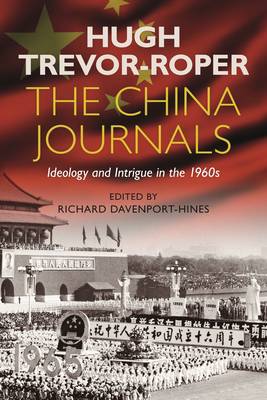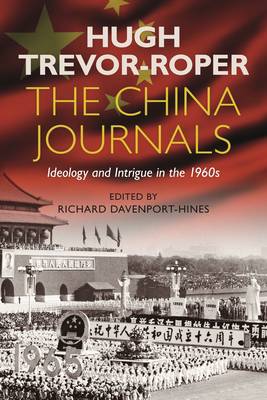
Bedankt voor het vertrouwen het afgelopen jaar! Om jou te bedanken bieden we GRATIS verzending (in België) aan op alles gedurende de hele maand januari.
- Afhalen na 1 uur in een winkel met voorraad
- In januari gratis thuislevering in België
- Ruim aanbod met 7 miljoen producten
Bedankt voor het vertrouwen het afgelopen jaar! Om jou te bedanken bieden we GRATIS verzending (in België) aan op alles gedurende de hele maand januari.
- Afhalen na 1 uur in een winkel met voorraad
- In januari gratis thuislevering in België
- Ruim aanbod met 7 miljoen producten
Zoeken
€ 31,45
+ 62 punten
Omschrijving
These private journals, made available here for the first time, record Hugh Trevor-Roper's visit to the People's Republic of China in the autumn of 1965, shortly before the outbreak of the Cultural Revolution, and describe the controversial aftermath of his journey on his return to England.
The visit was a catalogue of frustrations, which he relates with the verve and irony of a master narrator who relished the human comedy. His efforts to meet the real life and mind of China, in whose history and politics he had long been interested, were blocked at every turn by the resources of state propaganda and the claustrophobic attention of sullen Party guides. The visit was arranged by the London-based Society for Anglo-Chinese Understanding, which was ostensibly committed to the impartial interchange of culture and ideas. It proved to be run by a Communist claque whose ruthless methods of control outwitted the well-connected membership.
Back in England, and with help from MI5, he resolved to get to the bottom of the society's affairs. His investigations provoked a tumultuous public row which Trevor-Roper, no shirker of controversy, zestfully traces in these pages. Through the book, which closes with an account of his visit to Taiwan and South-East Asia in 1967, there runs the wisdom of historical perspective that he brought to contemporary events and his lifelong commitment to the defence of liberal values and practices against their ideological adversaries.
The visit was a catalogue of frustrations, which he relates with the verve and irony of a master narrator who relished the human comedy. His efforts to meet the real life and mind of China, in whose history and politics he had long been interested, were blocked at every turn by the resources of state propaganda and the claustrophobic attention of sullen Party guides. The visit was arranged by the London-based Society for Anglo-Chinese Understanding, which was ostensibly committed to the impartial interchange of culture and ideas. It proved to be run by a Communist claque whose ruthless methods of control outwitted the well-connected membership.
Back in England, and with help from MI5, he resolved to get to the bottom of the society's affairs. His investigations provoked a tumultuous public row which Trevor-Roper, no shirker of controversy, zestfully traces in these pages. Through the book, which closes with an account of his visit to Taiwan and South-East Asia in 1967, there runs the wisdom of historical perspective that he brought to contemporary events and his lifelong commitment to the defence of liberal values and practices against their ideological adversaries.
Specificaties
Betrokkenen
- Auteur(s):
- Uitgeverij:
Inhoud
- Aantal bladzijden:
- 296
- Taal:
- Engels
Eigenschappen
- Productcode (EAN):
- 9781350278097
- Verschijningsdatum:
- 27/01/2022
- Uitvoering:
- Paperback
- Formaat:
- Trade paperback (VS)
- Afmetingen:
- 155 mm x 226 mm
- Gewicht:
- 453 g

Alleen bij Standaard Boekhandel
+ 62 punten op je klantenkaart van Standaard Boekhandel
Beoordelingen
We publiceren alleen reviews die voldoen aan de voorwaarden voor reviews. Bekijk onze voorwaarden voor reviews.









